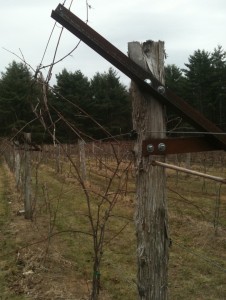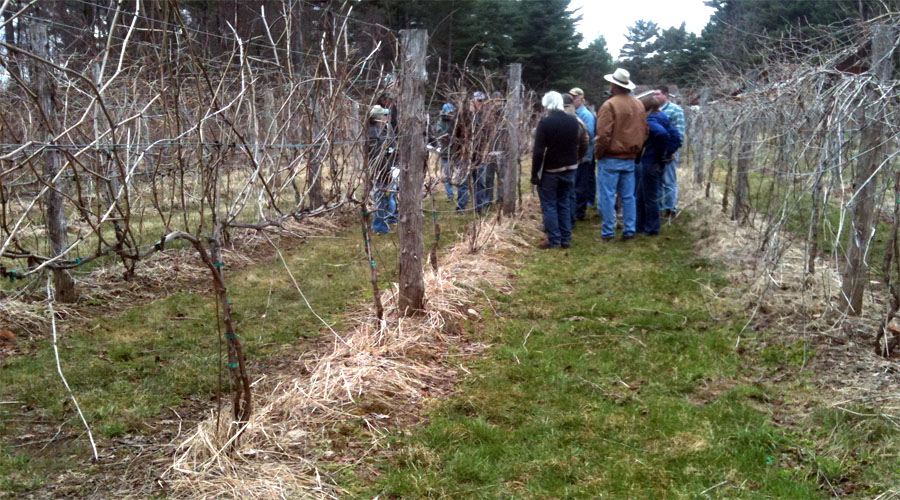Two educational events of interest to North Country viticulturists and winemakers, are being held this week, and come shortly after a series of dormant pruning workshops held in the Lake Champlain Region.
A day-long vineyard and winery planning workshop will be held on Wednesday May 4 in Herkimer County. On Tuesday May 8, the next installment of the Northern Grapes Project webinar series will be accessible to anyone who registers. Details for both events can be found below.
Over the past couple of weekends, volunteer pruning and informal training was completed at the Cornell Baker Farm Trial Vineyard in Willsboro, NY. Some of those participants had the opportunity to leverage what they had learned at a more formal event during the first weekend of the month. On April 7, an afternoon pruning and trellising workshop was coordinated by Kevin Iungerman of the Cornell Cooperative Extension Commercial Fruit program, and was held at Richard Lamoy’s Hid-In-Pines Vineyard, Morrisonville, NY. Two dozen people attended from nearby areas, and as far away as the lower Connecticut River Valley, to learn and practice the basics of vine pruning, as well a receive an introduction to several different training systems that are are employed.

Lamoy is the recipient of a 2012 SARE grant which will allow him to continue collecting data from a vineyard plot of over 400 cold hardy hybrid vines which was specifically designed and installed to do controlled comparisons of 4 training systems, 3 vine maintenance regimes, with 4 grape varieties, across 3 different soil types. His is likely one of the largest cold hardy trials in the state, and we will be visiting it with greater attention to detail in the future. Hid-In-Pines has already served as a location for training workshops in the past, and we expect that it will continue to host educational programming.
I have consistently been impressed by the content and delivery of the workshops and seminars that I have attended over the last several years. There is always a lot to take in, questions are answered in detail, and productive conversations are encouraged among participants with varying degrees of experience. Even with some eventual overlap of information among events, the reinforcement helps, and I have found that there is always something new to be learned. Cornell Extension Enologist Chris Gerling, will be instructing at these next two workshops, and I highly recommend his presentations as both informative and entertaining.
Two more Educational opportunities supported by the Northern Grapes Project:
Planning and Establishing Vineyards and Wineries in North Central New York
A Northern Grapes Project Enterprise Workshop
May 4, 2012 (8:00 AM - 4:30 PM)
Knights Inn, Little Falls, NY
Sponsored by Cornell Cooperative Extension Herkimer County
Registration: $50 (Includes lunch and Program Handouts)
This one day workshop is designed for newcomers with interest in establishing new vineyards and wineries based upon the cold-hardy hybrid grapes of the upper mid-west (Minnesota and Wisconsin). Aspects to be covered will include vineyard site selection and preparation; cool and cold-climate grape varieties and their wines; planting, training and trellising options; pest management; equipping a startup winery; basic economics and business models. Instructors: Chris Gerling, Tim Martinson, and Tim Weigle of Cornell.
For more information, please call 315-866-7920.
———————————————————————————————————-
The Northern Grapes Project Webinar Series
“Keep a Cork in It: Stabilizing Sweet Wines for Bottling”
Tuesday, May 8, 2012
12:00 Noon Eastern (11:00 AM Central) & 7:00 PM Eastern (6:00 PM Central)
Residual sugar (RS) is an essential part of many wine styles, and in the northern varieties it can be especially useful. Depending on the titratable acidity and other characteristics, even “dry” wines may require a little RS to achieve a balanced mouthfeel. Sugar is food for people and microscopic organisms alike and in wine, unless steps are taken to ensure that the product is microbially stable, problems ranging from off-aromas to self-ejecting corks may appear. Chris Gerling, extension associate for enology in Cornell University’s extension enology lab, will discuss principles of filtration and other chemical & microbiological means of inhibiting or killing spoilage organisms, as well as the various costs and benefits.
To Register: Registration is free, but required. To register, fill out the online form posted at:
https://cornell.qualtrics.com/SE/?SID=SV_9Rz9E79HQUpvnuY
Registration will be open from today (Friday, April 20th) through Friday, May 4th.
A few days prior to the webinar, those who register will be sent the web address (URL) for the Adobe Connect session. PLEASE NOTE: Only those who complete this online registration form will receive connection details to participate in the webinar. Even if you have registered for past webinars, you still must register for this webinar in order to receive the email.
Further Northern Grapes Project information is available on-line at http://northerngrapesproject.org/
The Northern Grapes Project is funded by the USDA’s Specialty Crops Research Initiative Program of the National Institute for Food and Agriculture, Project # 2011-51181-30850

